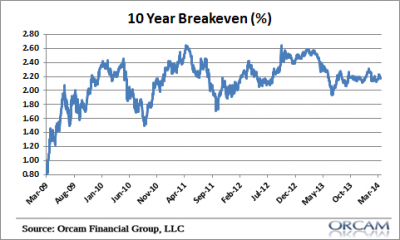Long time readers know that I think QE’s impacts have been vastly overstated. Not because it can’t do anything, but because the way it’s been implemented is imprecise. For instance, if the Fed were buying 10 year bonds at a specified rate of 1% then there’s no doubt that the Fed’s program would be dramatically impacting interest rates. But that’s not what they’re doing. They’re letting the price float and setting quantity of reserves. This is a strange way to implement monetary policy because it leaves room for so much imprecision. The Fed would never try to set the overnight rate by letting the price float. They set it specifically and challenge bond traders to move the price.
Anyhow, if you read the latest monthly letter from Bill Gross you’ll see a common refrain:
“While PIMCO agrees with Janet Yellen that such normalization will be a long time coming (the 12th of Never?), probabilities suggest that as the Fed completes its Taper, the 5–30 year bonds that it has been buying will have to be sold at higher yields to entice the private sector back in. The 1–5 year portion of the curve, beaten up recently due to Fed “blue dot” forecasts and Yellen’s “six months after” comments, should hold current levels if inflation stays low, but 5–30 year maturities are at risk. “
He thinks there’s risk in long-term yields rising due to a lack of demand. He says those higher yields will be needed to “entice” the private sector to hold the bonds. It’s not the first time he’s said something like this. In fact, he said it at the end of QE2 as yields were spiking. And I wrote a piece that day saying he was wrong about there being a lack of demand for bonds. Yields peaked within days and there was certainly no lack of demand for US government bonds following QE.
The problem I have with this view is that he’s viewing the Fed as supplying demand that wouldn’t have been there otherwise. This would make sense if real returns on Treasurys were negative and inflation was rising broadly. But that’s not the case. And the markets appear to have become totally oblivious to QE and taper in the last year as inflation expectations have hardly budged. Tapering hasn’t caused a reduction in inflation expectations at all.
What makes this even more odd to is that Gross expects inflation to remain low. So he’s implicitly saying the economy will be weak. Which means that long rates should continue to be a function of future expected real growth. And that means bondholders should continue to expect a positive real return on their bonds versus the alternative of generating a negative real return in cash. So I don’t see the big fuss. The markets appear to have become numb to all this talk about QE. And I doubt that the end of this latest edition of QE will have any significant impact on government bond yields.
Mr. Roche is the Founder and Chief Investment Officer of Discipline Funds.Discipline Funds is a low fee financial advisory firm with a focus on helping people be more disciplined with their finances.
He is also the author of Pragmatic Capitalism: What Every Investor Needs to Understand About Money and Finance, Understanding the Modern Monetary System and Understanding Modern Portfolio Construction.



Comments are closed.